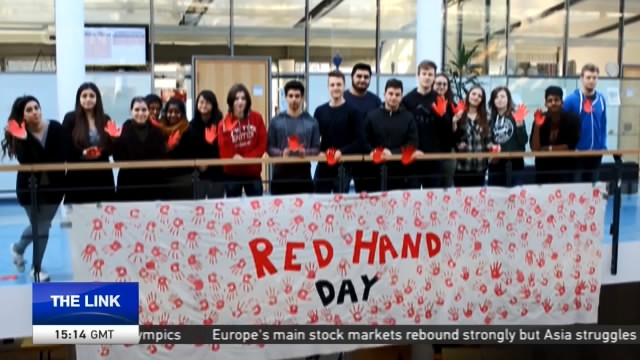
08:31, 13-Feb-2018
Children in Conflict: Fighting against recruitment of children in war

February 12 is Red Hand Day, the International Day Against the Use of Child Soldiers. A somber reminder that children continue to be used in armed conflicts all over the world. CGTN's Chuck Tinte has more.
The United Nations defines child soldiers as any child who has been recruited by an armed force or armed group in any capacity. That includes fighters, cooks, porters, spies or for sexual purposes.
Although most countries have outlawed the use of child soldiers, the group Child Soldiers International says 50 countries still train children under 18 for combat. So do many non-state armed groups.
Every year, the UN Secretary-General publishes a "list of shame" showing which state and non-state armed groups recruit and use children.
In 2017, countries on the list included Afghanistan, Colombia and the Democratic Republic of Congo.
CHILDREN IN CONFLICT Afghanistan, Central African Republic, Colombia, Democratic Republic of Congo, Iraq, Mali, Myanmar, Nigeria, Philippines, Somalia, South Sudan, Sudan, Syria and Yemen.
Child Soldiers International says non-state armed groups also recruit children in countries such as India, Pakistan and Thailand.
According to the United Nations, the number of children recruited continues to rise. It says more than 2,000 took up arms in the past three years. But most states and some non-state armed groups have now recognized the harm caused by recruiting children.
Child Soldiers International says that between 2001 and 2016, the number of countries restricting their military to adults has grown from 83 to 126. At least 60 non-state armed groups have also committed to stop or reduce recruitment of children. Last week, more than 300 child soldiers were released by armed groups in South Sudan. Last year, UNICEF's executive director released a new document to underscore its commitment to ending child recruitment.
ANTHONY LAKE UNICEF EXECUTIVE DIRECTOR "Today's outcome document underscores our commitment to do so. It calls for the unconditional release of all children without exception, and putting an end to child recruitment and use once and for all. It can be done. It calls for increased resources to find long-term reintegration programmes, programmes that include education so these children can start building their future that they deserve."
Across the world on Monday, campaigners have been raising awareness and demanding that children be left in peace.

SITEMAP
Copyright © 2018 CGTN. Beijing ICP prepared NO.16065310-3
Copyright © 2018 CGTN. Beijing ICP prepared NO.16065310-3